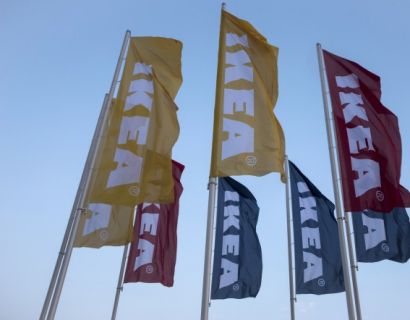Everything for  Business
Business
 Business
Business
 Business
Business
Total retail sales gained to 38.8 billion euros in full year
Company prepares to expand into South America for first time

Udit Kulshrestha/Bloomberg
Ikea plans to expand to about a dozen new markets in the coming years, including branching into South America, as the Swedish furniture giant aims to reach a total of 3 billion potential customers by 2025.
The company will in the coming years open stores in Chile, Colombia and Peru through a new Ikea franchisee called Falabella as part of its first foray into South America, Inter Ikea said in an emailed statement on Wednesday. Inter Ikea, which owns the Ikea concept and is the worldwide franchisor, also said the company plans to start selling its products in Mexico, Estonia, Ukraine, Puerto Rico, Oman, Luxembourg, Macau and the Philippines.
"By 2025, we have the potential to reach and interact with 3 billion people," Inter Ikea Chief Executive Officer Torbjorn Loof said in the statement. "We will offer new and different ways to shop the Ikea product range -- online, in remote locations and in city centers. We will introduce smaller store formats and offer a wide range of flexible and affordable services."
Ikea is in the midst of a transformation where it’s shifting resources toward emerging markets and alternative shopping experiences such as e-commerce and city center stores to better cater to customers’ changing needs. The new expansion plans were laid out as Inter Ikea reported a 4.5 percent increase in retail sales in the 12 months through August, adjusted for currency impact, at the franchisees that operate its more than 400 stores across the world.
Total retail sales, which include sales of both products and services, rose to 38.8 billion euros ($44.7 billion) from 38.3 billion euros a year earlier. In its last fiscal year, India and Latvia became new Ikea markets as the company opened 19 new stores around the world. In its fiscal year 2019, which runs through August, a total of 15 retail locations are planned. That includes a new store that was opened in Bahrain in September, Inter Ikea said.
Ikea’s stores, which can be found in more than 50 markets, welcomed 957 million visitors in the last fiscal year. The company now has online stores in 35 markets after its operations in Belgium, Romania and Malaysia introduced e-commerce. The company is also exploring selling its products on external online marketplaces and Loof said he hopes to introduce a collaboration with a digital shopping platform in the coming year.
Ikea’s foray into South America will see the company open nine stores and expand online in Chile, Colombia and Peru, through the Falabella franchise, in the coming decade.
"We’re very excited to open in South America," Loof said in a phone interview. "It will be a faster and bigger expansion than when we’ve entered new markets before."
The retailer will need at least 1 million cubic meters of goods in South America to break even, Loof said. Its first store is planned to open in Santiago in Chile in late 2020 and locations in Lima in Peru and Bogota in Columbia will then likely follow, he said.
Ikea’s transformation means franchisees like Falabella have a menu of options to choose from to jump start their expansion, including physical store formats and digital services. That means new Ikea franchisees should be able to "reach bigger volume faster with lower costs," Loof said.
In a separate statement, the largest Ikea franchisee, Ingka Group, said its full-year sales rose to 34.8 billion euros from 34.1 billion euros a year earlier. That’s some 90 percent of Ikea’s total retail sales. Ingka said it experienced sales growth in a majority of its 30 markets, with one of the biggest increases recorded in China.
After acquiring assembly service TaskRabbit in 2017, Ingka said it’s expanding that service to Canada this year after integrating it fully in the U.S. and U.K.
Bloomberg.com
 What are you doing with your RV in the offseason?
What are you doing with your RV in the offseason?
 Adobe will buy online design startup Figma for $ 20 billion
Adobe will buy online design startup Figma for $ 20 billion
 To combat the gas crisis, Germany offers a new plan for cheap transit
To combat the gas crisis, Germany offers a new plan for cheap transit
 Porsche family seeks iPO buyout after tearful defeat
Porsche family seeks iPO buyout after tearful defeat
 Clubs and bars are popping up all over Manhattan, providing an alternative social hub and jobs.
Clubs and bars are popping up all over Manhattan, providing an alternative social hub and jobs.
This site uses cookies and other visitor identifiers for the convenience of each user. If you stay on our site after reading this message, it means that you have no objection to the use of these technologies. Learn more
